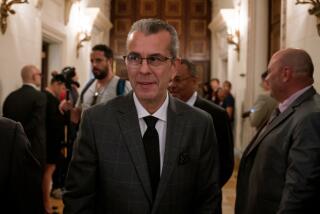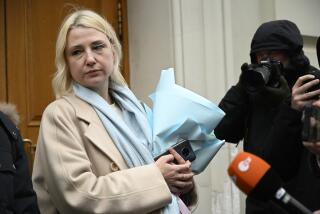Observers Criticize Kazakh Election : Central Asia: A list of the president’s handpicked candidates is cited. Censure is a setback to his image.
- Share via
ALMATY, Kazakhstan — International observers declared Tuesday that the first post-Communist parliamentary elections in this vast Central Asian republic, one of the most likely economic success stories in the former Soviet Union, were not sufficiently “free and fair.”
Kazakhstan held national elections Monday to form a new Parliament, as well as regional and city councils. The new Parliament of 177 full-time members will replace the former Supreme Soviet of 360 part-timers, which President Nursultan Nazarbayev dissolved three months ago.
A nine-member delegation from the Council for Security and Cooperation in Europe announced at a news conference in the Kazakh capital that the elections “did not meet internationally accepted standards for free and fair elections.”
The head of the CSCE delegation, Dutch lawmaker Jan van Houwelingen, listed 10 shortcomings--in particular, a special list of 65 candidates handpicked by Nazarbayev from which 42 were to be elected, nearly a quarter of the total.
This presidential list was ostensibly to ensure a balance of candidates from political and ethnic groups. In fact, it ensured Nazarbayev’s control over the legislature.
“In most countries,” said Van Houwelingen, “you don’t have a system where one person declares his own list (of candidates).” Another criticism was that the system for registering candidates was “severely flawed,” with one-sixth of the 900 potential candidates blocked from running because of their anti-Nazarbayev platforms.
Further, CSCE observers said, candidates were disqualified “in an arbitrary and capricious manner.”
The criticism came as a setback for Nazarbayev, a Communist Party leader turned reformer who has tried hard to show that he is a man with whom America can do business.
Kazakhstan, which covers more than 1 million square miles of steppe, desert and mountains between Russia and China, has attracted considerable American and European interest because of its potentially vast reserves of oil, gas and other raw materials.
It is strategically important not only because of its geographical location but as one of the four former republics--along with Russia, Ukraine and Belarus--that inherited a share of the Soviet Union’s nuclear arsenal. Kazakhstan has agreed to deactivate its 104 long-range SS-18 missiles, each of which carries 10 nuclear warheads.
Kazakhstan’s Central Election Commission said Monday that it had found no serious violations in the voting. But the more than 100 international observers expressed reservations about shortcomings in the electoral law and the need for further refinements to ensure more democratic elections in the future.
Many problems resulted from inexperience, rather than from deliberate attempts to rig results, monitors said. “Many electors did not understand the system of voting and voted simultaneously for several candidates,” Elizabeth Winship, another member of the CSCE delegation, said in Almaty, the capital formerly known as Alma Ata.
Despite the election’s shortcomings, the Parliament will represent a wider variety of political views than before in this ethnically diverse land. “The fact that elections were held, that opposition parties and candidates campaigned and expressed their views and that international observers were invited indicates a desire on the part of the government of Kazakhstan to move toward democracy,” Van Houwelingen said.
Opposition to Nazarbayev lies chiefly among Kazakhstan’s ethnic Russians, who total almost 40% of the population. The Russians are concentrated in the industrial north, where an oil shortage has left residents with little heat and hot water and where a government cash shortage has left many Russian coal and industrial workers broke. A political divide is widening between the Russians and ethnic Kazakhs, who also make up slightly more than 40% of the population. If one ethnic group wins a majority of seats, this election could widen the ethnic rift.
Nazarbayev’s special list of candidates, 75% Kazakh, may add fuel to the political fire. Among the CSCE’s recommendations for fairer elections is that the president’s list be eliminated in future elections.
Final election results are not due until Thursday, and they are not expected to change the republic’s political complexion radically.
More to Read
Sign up for Essential California
The most important California stories and recommendations in your inbox every morning.
You may occasionally receive promotional content from the Los Angeles Times.













